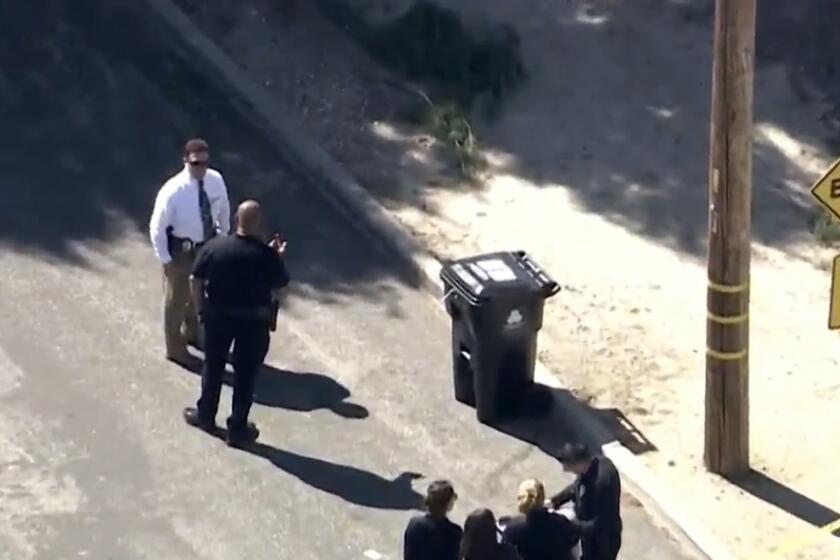Garcetti, Greuel focus on business, jobs plans
Jockeying to gain an edge in the mayoral runoff, Wendy Greuel and Eric Garcetti are highlighting plans to create jobs, cut red tape to help businesses and spur the city’s economy.
Garcetti on Friday discussed economic revitalization at a gourmet-sausage and craft-beer restaurant in Atwater Village, where the centerpiece of the neighborhood used to be a casket shop. Now it’s a hipster haven, with a Bikram yoga studio and the trendy farm-to-table eatery Canele. And Greuel, in her first stop Wednesday after winning a spot in the runoff, dropped by an architectural design firm in the San Fernando Valley that faced a series of problems when it tried to build an innovative facility with features like a permeable parking lot.
“I’m not going to hire a job czar, I’m going to be the jobs czar,” she said.
The increased emphasis on those topics since Tuesday’s balloting is partly a response to widespread criticism that neither laid out specifics during dozens of debates and months of primary election campaigning, said Raphael Sonenshein, director of the Pat Brown Institute for Public Affairs at Cal State Los Angeles.
“I have the feeling that in the runoff they’re going to be more specific than they’ve been so far, and I think one reason is with two candidates, it’s a lot easier to focus,” compared to the primaries, where five candidates stood on debate stages, he said. “Now it’s a job interview with only two people being interviewed for the job. I do think the cascade of commentary about the lack of specifics in the campaign has probably had an effect as well.”
He also attributed the city budget becoming a central discussion to the failure of the half-cent sales tax proposal on the Tuesday ballot, as well as a calculated effort to court fiscally conservative voters in the San Fernando Valley.
Garcetti said that he felt he had always been specific about his plans but that his proposals were drowned out by media coverage of mud-slinging.
“For me, I hope in the last 75 days of the campaign to get very specific,” he told small-business owners and neighborhood activists gathered at Link-n-Hops. “It’s difficult for that to make the headlines, [but] it’s more important than the latest accusation, mud-slinging from one to the next.”
Atwater Village is a “perfect example” of what happens when government works with residents and business owners, he said.
Garcetti said he hoped to replicate the transformation that occurred there citywide, with a “great streets initiative” that would use zoning and planning features such as streetscapes and pedestrian-friendly villages to create inviting neighborhoods.
“People want to be here,” Garcetti said, nibbling on a Polish sausage with sauteed onions and spicy pickles.
He highlighted his work of streamlining permitting, such as setting up a website where, with three clicks, a business owner would find every permit needed to open a new operation. Restaurants, he said, are notoriously hard to open, sometimes requiring a lobbyist and taking 18 months.
“I mean, it’s crazy,” he said, pointing to a beer garden he helped in Hollywood. “We got it done in — I don’t know — nine to 10 months; we cut it basically in half, and they said because you did that that quickly, we’re going to open up a third location because we saved enough money.
“So it’s a combination of making sure we can streamline our permits, have lower taxes in smart ways, not across the board — we need taxes for our city services — and then figure out a way to [improve] neighborhoods,” he said.
Greuel had delivered a similar message at the architectural firm, which faced obstacles when it tried to open a new operation.
Greuel said that as an owner of a small business, “I get it,” and added that was a reason she became a councilwoman representing the San Fernando Valley. She cited some of her accomplishments on the City Council, including implementing business tax reform and helping businesses such as Wet, a design firm.
“The project was being held up, delayed, stuck in a maze of red tape and bureaucracy,” Greuel said, noting that her office interceded to help speed the project through. “Unfortunately, their experience is not an exception. It becomes the rule about how businesses are treated in city government.”
More to Read
Start your day right
Sign up for Essential California for news, features and recommendations from the L.A. Times and beyond in your inbox six days a week.
You may occasionally receive promotional content from the Los Angeles Times.








